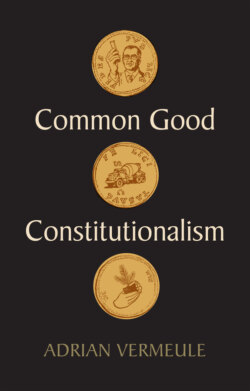Читать книгу Common Good Constitutionalism - Adrian Vermeule - Страница 20
Shibboleths Dispelled
ОглавлениеBeyond my positive and negative claims, a final aim of this book is to dispel some commonly heard, but erroneous, assumptions or shibboleths about common good constitutionalism.35
It is entirely question-begging to say that interpretation in the classical tradition “departs from the meaning of the text” or “substitutes morality for law.” Rather the classical tradition, in appropriate cases, looks to general principles of law and the ius naturale precisely in order to understand the meaning of the text, as a mode of interpretation. It claims that while there are powerful arguments of political morality to respect lex as law, it is also true that lex, precisely because it is law, must be interpreted in light of ius. The classical tradition thus claims that principles of political morality are themselves already part of the law and internal to it.
Relatedly, the classical tradition does not substitute “preferences” for law; it claims that there are objective principles of legal justice accessible to the reason, that it is entirely possible to “find” rather than “make” law.36 That claim may or may not be correct, but it is utterly tendentious to take it for an entirely different claim which no one makes, that interpreters are licensed to enforce their own arbitrary “preferences.” Even purportedly positivist arguments are informed by some conception or other of the common good, and it is entirely legitimate to examine, in the light of reason, whether any given conception of the common good is a plausible one.
The classical tradition does not, at least not primarily, see the point of natural law as overriding the positive civil law (a view created by excessive focus on the natural rights strand of the classical tradition). Rather it mainly draws upon the natural law both to construe the civil law and to justify action for the common good on the part of the political authority.
The classical tradition, in itself, does not license judges in particular to rule as they see fit for the common good. It takes no a priori position on questions like the appropriate scope of judicial review, the exact balance between political and legal constitutionalism, or the importance of “democracy” (somehow understood) vis-à-vis judicial review. Many different institutional allocations of decision-making authority can be ordered to the common good and be consistent with it. The liberal mind finds it hard to process that the whole focus of the theory is not on advocating for particular forms of institutional technology or particular institutional arrangements, but instead on the purposes or ends to which law is aimed. A range of institutional technologies can in principle be ordered to the common good. Whether they can be so in practice is a function of particular conditions in particular constitutional orders, and thus a matter for prudential arrangement, not a matter of conceptual necessity.In our own system, judges are generally, or presumptively, bound to respect reasonable determinations in the public interest by the legislature and the executive, perhaps under legislative delegation. Again, this is not a necessary claim about constitutionalism; it is an interpretive claim about the American constitutional order. And it also happens to hold true for other constitutional orders, such as the system of European human rights law, one of whose fundamental principles is the “margin of appreciation”37 – very roughly, an appropriate margin of discretion for member states and public authorities to decide how best to implement legal respect for human rights.
It is irrelevant that there was, is, and will be disagreement between classical lawyers over the content of the common good and the natural law, in hard cases. The same is chronically true of the positive civil law, indeed of any body of law (whether lex or ius or both) that is more than trivial. Disagreement, by itself, is neither here nor there, and it is hardly unique to the natural law or the common good. Every June, the Supreme Court gives ample illustration that a body of nine lawyers may split almost down the middle as to the meaning of positive laws, yet without undermining the belief of any of the Justices that there is nonetheless a right answer. As Richard Helmholz puts it, partial indeterminacy “is true of virtually all fundamental statements of law – Magna Carta, the Bible, the United States Constitution, for instance. They have not lost their value or forfeited their respect among lawyers despite long continued variations in the conclusions to be drawn from their contents.”38 And, Helmholz continues, “natural law itself did not claim to provide definitive answers to most legal questions that arose in practice.”39 Rather it provides general principles that must be rendered concrete by determination.In short, the possibility of “disagreement” is often cast as an objection to classical constitutionalism by those who ignore profound disagreements over the positive constitutional law, and over the best conception of abstract constitutional concepts embodied in that law, such as “liberty” and “equality.” This arbitrarily selective emphasis on disagreement is an infallible sign of ideology, a kind of myopia. These and other points will be explicated in what follows.
